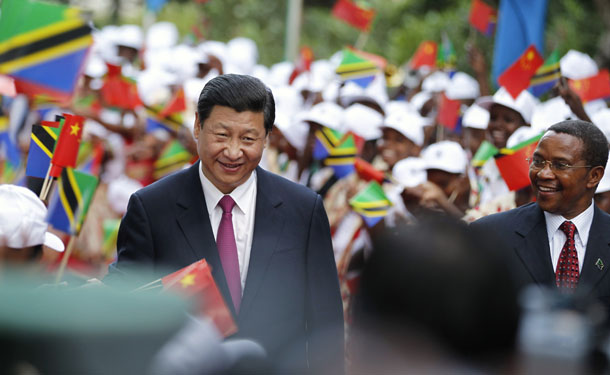DAR ES SALAAM — Tanzania is studying a report alleging that Chinese officials bought large amounts of illegal ivory during a visit by President Xi Jinping last year and smuggled it out in diplomatic bags aboard his plane, a Tanzanian government official said on Thursday.
Beijing denied the allegation by an environmental campaign group, describing it as without foundation.
Poaching has risen in recent years across sub-Saharan Africa, where well-armed criminal gangs have killed elephants for tusks and rhinos for horns that are often shipped to Asia for use in ornaments and medicines.
The situation has been most dramatic in Tanzania, where 10,000 elephants were killed last year alone, according to the Environmental Investigation Agency (EIA), the international campaign group which reported the alleged Chinese smuggling.
“The government is studying the report and will issue a statement at the appropriate time,” a Tanzanian government official, who asked not to be named, told Reuters.
“China has a special relationship with Tanzania. We don’t want to make any rash comments before we establish the real truth behind these allegations.”
At a daily news briefing in Beijing, Chinese foreign ministry spokesman Hong Lei called the report “baseless.”
Hong said China was committed to upholding international conventions on protecting endangered species and stopping the smuggling of ivory into China.
Tanzanian President Jakaya Kikwete said on Nov. 4 that China was his country’s “all weather friend” after returning from an official visit to Beijing where officials of the two countries signed multi-billion-dollar investment deals.
Officials in the east African nation have said they see poaching as a threat to tourism, a major foreign currency earner.
Crime and Corruption
EIA said its findings are based on meetings between its undercover investigators and individuals tied to the trade.
“The poaching crisis in Tanzania is due to a toxic mix of criminal syndicates, often led by Chinese nationals, and corruption among some Tanzanian government officials,” its report said.
The group said it had dispatched undercover investigators to meet with “a tight-knit group of traders” at the Mwenge market in Dar es Salaam, which it called an important hub for ivory trading.
Two of those traders said that ivory sales had boomed when a large entourage of businessmen and government officials accompanied Xi on a state visit to Tanzaniain March 2013.
“The two traders claimed that a fortnight before the state visit, Chinese buyers began purchasing thousands of kilos of ivory, later sent to China in diplomatic bags on the presidential plane,” the report said.
It quoted one of the men as saying the scale of the buying was such that the price per kilogram of ivory had doubled to $700 during the visit.
More than 1.3 million elephants roamed Africa in 1979, but the number has dwindled to an estimated 419,000 today, according to figures quoted in the EIA report. The scale of poaching in the 1980s sparked an outcry, prompting the adoption of a ban on international commercial ivory trade in 1989.
Tanzania’s elephants, which had been making a comeback over the last decade, “are again being slaughtered en masse to feed a resurgent ivory trade,” the report said.

















